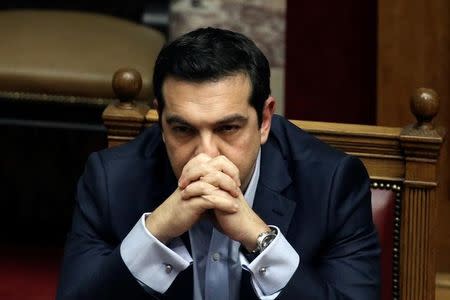Sliding in polls, Greece's Tsipras seeks pensioners' support

By Karolina Tagaris and Renee Maltezou ATHENS (Reuters) - Greek Prime Minister Alexis Tsipras seems determined to go down in history as a leader who tried to save Greece's most vulnerable from austerity. But the crowd of pensioners in Athens on Thursday night was cynical about his promise to placate them with a one-off Christmas bonus. "We are living in misery and we won't tolerate being fooled any more," said Stavros Bokias, 75, one of hundreds of elderly Greeks protesting against deep pension cuts over the years. Under Greece's latest bailout, Athens can spend more on social programmes if it exceeds its fiscal targets, provided it consults its creditors first. Earlier this year, Greek lawmakers approved a social justice bill providing health insurance to vulnerable citizens and offering jobs for the unemployed. But political experts say the bonus was calculated to garner public support ahead of a big showdown with Greece's emergency lenders, the European Union and International Monetary Fund. They were concerned that the bonus showed Athens was retreating from its commitment to fiscal reform and reacted by shelving the prospect of short-term debt relief. Trailing badly in opinion polls, Tsipras needs support of politically powerful pensioners to help him stage another big confrontation with the lenders at a critical juncture in his effort to resist pressure on Greece to adopt more austerity. "Tsipras has repeatedly said that 'Greece will exit the crisis with its people standing on their feet'," a government official told Reuters when asked to comment on the premier's strategy regarding the Christmas bonus announcement. "This payout is part of this policy which he is determined to implement." ELECTION SPECULATION Speaking in Berlin on Friday, Tsipras said Greece would return to growth in 2017 after years of recession, and that economic development should not just be measured by statistics. "We want it to heal the wounds of crisis and to alleviate all those who have over these difficult years made huge sacrifices in the name of Europe," he said. But pensioners are having none of it. Almost a dozen pension cuts have pushed nearly half of Greece's elderly to below the poverty line with income of less than 665 euros a month. After rent, utility bills and health care, they barely make ends meet. "They are handing out crumbs compared to what they stole from us," Bokias said at the protest in central Athens as another demonstrator mocked the prime minister's populist gesture by handing out fake 50 euro notes. There is speculation among parliamentarians that Tsipras is prepared to call early elections next year. This would threaten the euro zone with further political uncertainty at a time when France, Germany and Italy are also on an election footing. His office has ruled out early elections but Tsipras has a history of resorting to the ballot box in big showdowns with lenders, most recently calling snap polls in September 2015 to consolidate his power and strengthen his hand in negotiations. Back then, he was riding high in opinion polls. Now, though, his leftist Syriza party is languishing more than 10 points behind conservative New Democracy and is widely viewed as having broken its promise to do away with austerity. Tsipras is eager to make a quick breakthrough with lenders next year, so that Greece can join other EU nations in joining the European Central Bank's quantitative easing programme from which is has been excluded, but he is being asked to first make more painful reforms. As encouragement, the EU and IMF granted short-term debt relief, but then Tsipras announced the bonus, called IMF technocrats 'fools' and warned lenders not to tell Greece what to do with its hard-earned budget surplus. Theodore Couloumbis, a political analyst, said elections next year were very likely and the government could be preparing the ground for a "heroic exit". "The government cannot go on. It's hanging by a thread," Couloumbis said. "Clearly it's to get a good rating in opinion polls ... He's stretching it because he can, at a time when Europe is being shaken." TOO LITTLE, TOO LATE Another government official said Tsipras was not thinking about a snap election but if forced to do so, the government would at least have paid out something to suffering pensioners. Greek pensions can still look generous on some measures, even after 11 cuts in the last six years. In 2014, four years into austerity, they accounted for 17 percent of gross domestic product, the highest in the European Union. That compared with 16.5 percent for Italy, 15.2 percent for France and 12.8 percent for Spain, according to Eurostat's latest data. Greece says the Christmas bonus, worth 300-500 euros each for its 1.3 million pensioners, does not breach the terms of its bailout. At a total cost of 617 million euros, it comes after the government exceeded its primary surplus target for 2016. But the hand-outs have so far failed to whip up any obvious increase in support for Tsipras among pensioners. Some have seen their monthly cheque fall between 40 and 50 percent in six years. For Nikiforos, a 76-year-old pensioner from the town of Thessaloniki, it is too little, too late. After 46 years of paying into a pension fund, he receives a monthly cheque of 436 euros while his living costs rise. This year, authorities scrapped a 230 euro top-up pension he received a month, and chopped an additional 50 euros from his main pension. "They want us to beg, but we still have our dignity," he said. (Additional reporting by Theodora Arvanitidou and Angeliki Koutantou; Writing by Michele Kambas; Editing by Mark Bendeich and Anna Willard)

